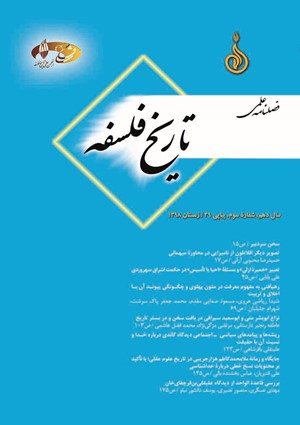ریشه¬ها و پیامدهای سیاسی ـ اجتماعی دیدگاه گاندی دربارة خدا و نسبت آن با حقیقت
محورهای موضوعی : پیوند اندیشۀ فیلسوفان و مکاتب فلسفی با زمانه و شرایط اجتماعی و فکری
1 - دانشگاه بين¬المللي امام خميني (ره) قزوين
کلید واژه: خدا حقیقت گاندی آهیمسا پیامدهای سیاسی ـ اجتماعی,
چکیده مقاله :
مقاله حاضر ریشه ها و پیامدهای سیاسی ـ اجتماعی دیدگاه گاندی در بارة خدا و نسبت آن با حقیقت را بررسی ميكند. تصورگاندی از خدا و حقیقت، ریشه در مکتب فلسفی ودانتا (Vedanta)، آیین دینی ویشنویی (Vaishnavism) و مطالعات او دربارة اسلام و مسیحیت دارد. بر اساس مکتب ودانتا، حقیقت در دو مرتبه نیرگونا (nirguna/ حقیقت عاری از صفت یا مقام ذات) و ساگونا (saguna/ حقیقت مزین به صفات یا مقام اسماء و صفات) مطرح است. در آيین ویشنویی نیز از ویشنو که یکی از خدایان ودایی است، بعنوان خدای متشخص و اصل محافظتکنندة عالم یاد میشود. گاندی بدليل گرایش فلسفی به مکتب و دانتا و اعتقاد خانو ادگی به آيین ویشنویی، هم به خدای غیرمتشخص (ودانتایی) و هم به خدای متشخص (ویشنویی) باور داشت. او در ابتدای سیر فکریش بدلایل گوناگون، به این نتیجه میرسد که خدا عین حقیقت است، زیرا فقط از خدا میتوان بعنوان حقیقت یاد نمود. به نظر او حقیقت صفت خدا نیست بلکه عین خداست؛ در متون فلسفی هند نیز برای حقیقت از واژة ساتیا (satya) استفاده میشود که ریشه در سات (sat/ هست) دارد، یعنی خدا عین حقیقت و هستی است. گاندی سپس به این نتیجه رسيد که بجای اینکه بگوید «خدا حقیقت است»، بگوید «حقیقت خداست». از نظر او میان دو گزارة «خدا حقیقت است» و «حقیقت خداست» تمایز ظریفی وجود دارد. او تنها راه رسیدن به حقیقت را طریق آهیمسا (ahimsa) میداند و در تبيين مفهوم آهیمسا به مفهوم دیگری بنام ساتی آگراها (satyagraha) اشاره میکند كه بنظر او تکنیک بکار بردن آهیمسا است. دیدگاه گاندی دربارة خدا و حقیقت، تأثیر زیادی بر نحوة مبارزات سیاسی و اجتماعی او علیه استعمارگران انگلیسی داشت که در اين مقاله به آن پرداخته ميشود.
The present paper investigates the socio-political roots and consequences of Gandhi’s view of God and God’s relationship with truth. His idea of God and truth is rooted in Vedanta School of philosophy, Vaishnavism, and his studies of Islam and Christianity. Based on Vedanta philosophy, truth is discussed at two levels of nirguna (a truth without attributes or station of essence) and saguna (a truth with attributes or the station of names and attributes). In Vaishnavism, reference is made to Vishnu, who is one of the Vedic deities, as a personal God and the preserver of the world. Because of his philosophical interest in Vedanta and his family belief in Vaishnavism, Gandhi believed in both impersonal (Vedantic) God and personal (Vishnu) God. At the beginning of developing his philosophical thoughts, for several reasons, he concluded that God is the same as the truth for he believed that one can only refer to God as the truth. In his view, truth is not an attribute of God and is, rather, the same as God. In Indian philosophical texts, the term satya is used to refer to the truth. The root of this word is /sat/ (is) meaning that God is the same as the truth and being. Later Gandhi decided that, instead of saying, “God is the truth”, he should say, “the truth is God”. In his view there is a subtle difference between these two statements. Gandhi states that the only way through which one can attain the truth is ahimsā (non-violence) and, in order to clarify this term, he refers to the concept of satyagrah (holding to the truth), which, he believes, is the technique of using ahimsā. This mainly focuses on the great influence of Gandhi’s approach to God and the truth over the quality of his socio-political campaigns against British colonists.
تفضلی، محمود (1337) مجموعهيي دربارة گاندی، پدر ملت هند، تهران: سفارت هند.
شایگان، داریوش (1356) ادیان و مکتبهای فلسفی هند، تهران: امیرکبیر.
Bose, N. K. (1947). Selections from Gandhi. Calcutta Indian Association Publishing Company.
Cush, D. (2008). Encyclopedia of Hinduism. London: Routledge.
Gandhi, M. K. (1927). An Autobiography or the Story of My Experiments with Truth. Ahmadabad-India: Navajivan Publishing House.
Gandhi, M. K. (1999). What is Hinduism. New Delhi: National Book Trust.
Jone, C. A. and Ryan James D. (2007). Encyclopedia of Hinduism. New York: Facts on File.
Kulke, H. and Rothermund, D. (1994). A History of India. London: Routledge.
Lal, B. K. (1973). Contemporary Indian Philosophy. New Delhi: Motilal Banarsidas.
Plotkin, M. F. (No date). Resistance to the Soul: Gandhi and his Critics. www.mkgandhi.org/articles/soul.htm accessed 19 January 2013.
Radhakrishnan,S. (1983). Indian Philosophy. Vol.1. Bombay: Blackie and Son Publishers.
Raju, P.T. (1983). Structural Dept of Indian Thought. India: South Indian Publishers.
Radhakrishnan, S. and Muirhead, J.H. (2004). Contemporary Indian Philosophy.London: George Allen and Union LTD.
Sharma, Chandradhar (1983). A Critical Survey of Indian Philosophy. New Delhi: Motilal Banarsidas.
Walsh, E. J. (2011). A Brief History of India. New York: Facts on File.

